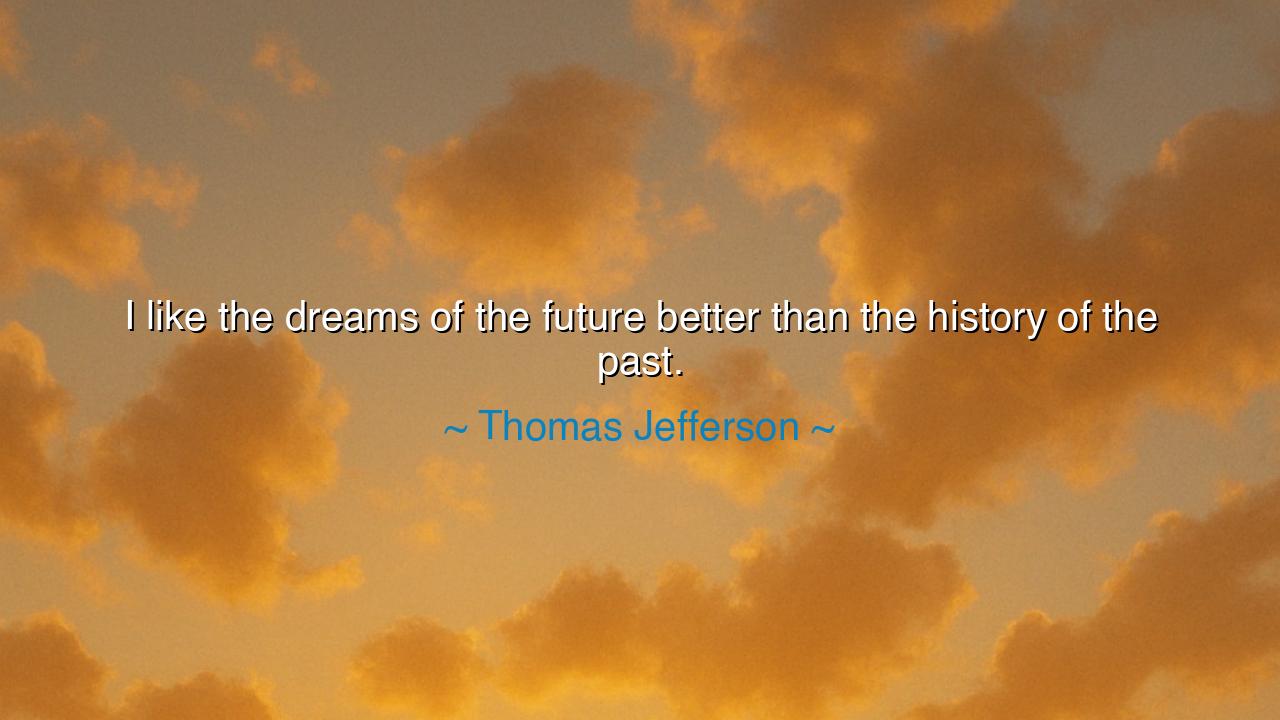
I like the dreams of the future better than the history of the






"I like the dreams of the future better than the history of the past." These words spoken by Thomas Jefferson reveal a profound insight into the human condition—an aspiration toward progress and possibility, and a belief that the future holds greater promise than the past. Jefferson, a man deeply embedded in the revolutionary ideals of freedom and innovation, understood that while the past holds important lessons, it is the dreams of the future that shape the trajectory of humanity. The history of the past is written with the ink of mistakes, struggles, and triumphs, but it is the dreams—the visions of what could be—that propel us forward, inspiring us to transcend the limitations of what has already been.
In the ancient world, the idea of progress was often tied to a vision of the future, yet the past was revered for its wisdom. Socrates, the great philosopher of Athens, spoke not of glorifying the past, but of seeking truth and wisdom in the present to shape a better tomorrow. He urged his students to engage in philosophical dialogue, not just to understand the history of thought, but to discover new ideas that could lead to personal and societal advancement. In the same vein, Jefferson’s words challenge us to value the lessons of history, but to focus our energies on creating a future that is defined by growth, innovation, and the dreams of what humanity can become.
Consider the example of Alexander the Great, whose ambitions were not anchored in preserving the traditions of the past, but in shaping the future. Alexander’s conquests were motivated by a vision of a world united under his rule—a world that transcended the borders of his homeland and sought to merge cultures, create new opportunities, and establish a lasting legacy. Alexander looked beyond the history of previous empires and sought to forge his own path, reshaping the world as he saw fit. Jefferson, like Alexander, believed that the future was a realm of boundless possibilities, a place where humanity could build upon the foundations of the past but not be restricted by it.
In the Renaissance, the great minds of the time also demonstrated a shift from focusing on the limitations of the past to dreaming of new futures. Figures like Leonardo da Vinci and Michelangelo were not merely concerned with reviving the ancient arts of Greece and Rome, but with innovating and creating new forms of expression and understanding. Da Vinci, in particular, was obsessed with future possibilities—from his designs of flying machines to his anatomical studies, he saw the present as a springboard for the boundless dreams of what might come. His work exemplifies the idea that the dreams of the future are more powerful than the limitations of the past. Thomas Jefferson, too, was driven by a vision of a future based on reason, liberty, and scientific progress, and he saw the United States not just as a nation of the present, but as a beacon for the future.
In contrast, the past can often hold us back with its baggage of tradition and convention. The Romans, despite their impressive empire and achievements, were often bound by their respect for tradition, which at times prevented them from embracing change. Julius Caesar, however, demonstrated the power of looking beyond the past, as he sought to reform Roman government and society, introducing changes that were revolutionary for his time. His ambition to create a new Rome, free from the constraints of the past, was a testament to the vision of a future defined not by what had been, but by what could be. In this light, Jefferson’s statement aligns with the spirit of Caesar’s ambition—to push forward, unafraid to dream of a better world.
Jefferson’s idea that we should value the future more than the past also invites us to reflect on the limitations that come with nostalgia and attachment to old ways. It is easy to romanticize the past, to view it through the lens of idealism, especially when the present feels uncertain or challenging. However, as Heraclitus, the ancient philosopher, taught, "You cannot step into the same river twice." The world is always changing, and so must we. To embrace the future, we must let go of the past’s hold on us and approach the world with openness, curiosity, and hope. Jefferson’s words encourage us to focus on the possibilities ahead, recognizing that our greatest potential lies in what we can create, not what we have already accomplished.
The lesson we can take from Thomas Jefferson’s quote is clear: while the past provides valuable lessons, it is the future—shaped by our dreams, our visions, and our ambitions—that holds the greatest promise. We must look ahead, with a sense of purpose and optimism, always striving to create and innovate in ways that push the boundaries of what has been. This does not mean disregarding history, but rather using the wisdom of the past to fuel a better future. As we move forward, let us be guided by dreams of what could be, knowing that the present is the seed from which tomorrow’s possibilities will grow.
In practical terms, this means embracing change, investing in growth, and allowing our visions to guide our actions. Whether in our personal lives, in our careers, or in society, we must commit ourselves to progress—to dreaming of new ways to improve, to solve problems, and to create a better world for future generations. Like Jefferson, we must be willing to dream big and to see the future as an opportunity to break free from the constraints of the past and build something extraordinary.






AAdministratorAdministrator
Welcome, honored guests. Please leave a comment, we will respond soon